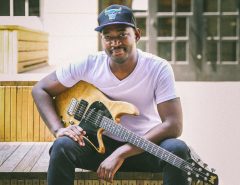The Music Department at Columbia College Chicago is pleased to announce our Artists in Residence for the 2016-2017 season: Shawn Mullins, Stefon Harris, Donny McCaslin, and Cory Henry!
Shawn Mullins in Residence October 24-29
Residency Concert at the Music Center – 7:00 PM October 29th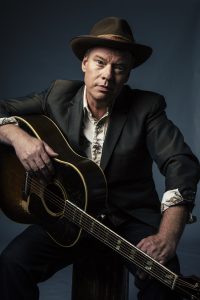
Singer-songwriter Shawn Mullins readily admits that several of the songs on his new album, My Stupid Heart, address his perceived relationship failures. In fact, many were written as he was falling out of his third marriage; in the title tune, he actually chides himself for being such a romantic. But it’s also a bit of a joke, he says, because he firmly believes in following his heart — no matter where it leads. That oh-so-fallible, yet essential part of our being is, it turns out, the guiding force behind just about every song on the album — the theme of which, he says, is summed up most succinctly by another song title: “It All Comes Down to Love.
In that respect, Mullins says, it’s not all that different from most of his discography — which includes 1998’s Soul’s Core, the album that shot him to fame on the strength of its Grammy-nominated No. 1 hit, “Lullaby,” and 2006’s 9th Ward Pickin’ Parlor, which contained his AAA/Americana No. 1, “Beautiful Wreck.” (He also co-wrote the Zac Brown Band’s No. 1 country tune, “Toes.”) But in the years since his last release, 2010’s Light You Up, Mullins has experienced more ups and downs on his romantic roller-coaster — a ride he’s decided to step off for a while. He’s also stayed busy co-parenting his son, Murphy, with his second wife.
Still, nothing inspires songwriters quite like a breakup, and Mullins confirms, “This record came out of all that; all the feelings, all the heartache.” He remembers sitting on his porch one afternoon, thinking, “‘I know this is all in my head, but it’d be a lot easier just to blame it on my heart.’ And then I thought, ‘Yeah, it’s my stupid heart.’” Next thing he knew, lines like “my stupid heart it plays for keeps/through hoops of fire it bounds and leaps” just started tumbling out. In the studio, the song took on a classic vibe, with impeccable instrumentation and production that sounds as if George Martin supervised.
Whether composing alone or with others — including Matthew Sweet and Pete Droge, his bandmates in the early-2000s trio the Thorns — Atlanta native Mullins has always been a dynamic songsmith. Forging influences from folk and R&B to traditional country and even Broadway musicals (the funky ones, like Jesus Christ Superstar and Godspell) with pop-leaning melodic sensibilities, he crafts memorable, affecting tunes best defined as Americana.
Mullins majored in music education at North Georgia College, where he began performing in earnest and released his first album (cassette, actually) of originals. After graduating, he served in the U.S. Army Reserves at Fort Benning, Georgia, where he jumped out of a few airplanes before jumping full-time into music in 1992. Eventually, he formed his own label, and in 1998, he released Soul’s Core. Steve Craig, a DJ at Atlanta’s modern-rockish WNNX-FM, picked up on “Lullaby,” spinning it on his “Locals Only” music show. He took it to program director Leslie Fram, who not only put it heavy rotation, but sent copies to a few dozen fellow PDs. Soon, Mullins was getting regular airplay on at least 15 stations. He went from modestly hoping sales might reach 20,000 units, far beyond his four-digit average, to moving 30,000 copies per week, on his way to platinum status.
Labels that had ignored his earlier efforts to get their attention suddenly clamored to sign him; at least 25 came knocking. Columbia won the bidding war; Mullins spent six years there before moving to Vanguard, which recently joined forces with Rounder/Sugar Hill under the Concord Music Group umbrella.
In addition to his collaborations for this album, Mullins spent some of his time since Light You Up writing with other Nashville hitmakers; he also contributed to the striking 2012 album, Mercyland: Songs for the Rest of Us. But he admits he’s eager to hit the road again.
“I’m in a new place in my life, a place of freedom, artistically — and a real grounded place of bein’ a dad,” he says. “I’m really excited about the possibilities.” Though he may be wearing a little more emotional armor this time, he’s also armed with new insights, so many of which are relayed in these songs. And when he steps onstage each night, he sings them with all the passion he’s got in his anything-but-stupid heart.
Elizabeth Wtorkowska in Residence October 24-31
Stefon Harris in Residence November 1-6
Residency Concerts at the Jazz Showcase – 8:00 PM & 10:00 PM on November 3-5, 4:00 PM & 8 PM on November 6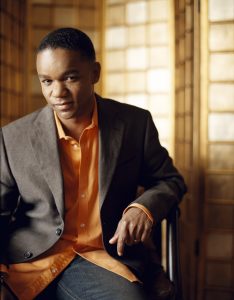
Vibraphonist-composer Stefon Harris is heralded as “one of the most important young artists in jazz” (The Los Angeles Times). He is unquestionably developing what will be a long and extraordinary career.
Stefon Harris’ passionate artistry, energetic stage presence, and astonishing virtuosity have propelled him into the forefront of the current jazz scene. Widely recognized and lauded by both his peers and jazz critics alike, he is committed to both exploring the rich potential of jazz composition and blazing new trails on the vibraphone.
A graduate of The Manhattan School of Music, he received a B.A. in Classical Music and an M.A. in jazz performance. Stefon is a recipient of the prestigious Martin E. Segal Award from Lincoln Center and has earned back to back to back Grammy nominations for Best Ja zz Album including The Grand Unification Theory (2003), the 2001 release of Kindred (Blue Note) and his 1999 release of Black Action Figure (Blue Note) for Best Jazz Instrumental Solo. North Sea Jazz (Netherlands) named Harris for the prestigious International 2002 Bird Award for Artist Deserving Wider Recognition. He has been voted Best Mallet player by the Jazz Journalist Association (2003, 2002, 2001 and 2000), Debut Artist of the Year by Jazztimes, Downbeat’s Critics Poll Winner for Vibraphone and Rising Star, Vibraphone (2003) Newsweek’s Best Jazz CD, Best New Talent and 1999-2000 Readers Poll Best Vibraphonist by Jazziz Magazine and Chicago Tribune’s Debut of the Year.
Mr. Harris has performed at many of the world’s most distinguished concert halls, including Lincoln Center’s Alice Tully Hall. The Kennedy Center, San Francisco’s Herbst Theater, UCLA’s Royce Hall, Chicago’s Symphony Center, Detroit’s Orchestra Hall, and The Sydney Opera House. He has toured and recorded with the Chamber Music Society of Lincoln Center and performed his original compositions with the Dutch Metropole Orchestra in Den Hague. He has toured South Africa, Brazil and Europe performing at the North Sea Jazz Festival, Istanbul Jazz Festival and the Umbria Jazz Festival, among others.
In 2001 he premiered “The Grand Unification Theory” — a full length concert piece commissioned by The Troy Savings Bank Music Hall which was later presented at the New Jersey Performing Arts Center. He has also appeared at the legendary Playboy Jazz Festival, Montreal Jazz Festival and the Orange County Performing Arts Center. Most recently Mr. Harris received a commission from The Wharton Center for Performing Arts, Michigan State University which will debut in 2005.
An active educator Mr. Harris conducts over 100 clinics and lectures annually at schools and universities throughout the country. He is currently Artist in Residence at San Francisco Performances and in 2002 at The Isabelle Stewart Gardner Museum in Boston. In addition he has been an active member of the Executive Board of Directors for Chamber Music America.
“Blackout,” Stefon’s new project featuring a hybrid of acoustic music and progressive sounds debuted its CD, Evolution in April 2004 and also embarked on a national tour. Praised for “pursing jazz on its own terms” (Washington Post); the band features Casey Benjamin (alto sax), Marc Cary (keyboards), Darryl Hall (bass) and Terreon Gully, and has performed to sold out crowds at The Kennedy Center and North Sea Jazz Festival. The 2003 release of The Grand Unification Theory; an eleven movement piece featuring Latin, Classical, African and Jazz influences earned a Grammy nomination, JAZZIZ Critics Choice and 4 star reviews from Downbeat Magazine, Rolling Stone and The Los Angeles Times,
His 2001 CD Kindred earned him his second Grammy nod for Best Jazz Album. A quartet recording with the noted pianist Jacky Terrasson Kindred is a follow-up to his sophomore release Black Action Figure (Blue Note Records) which was also nominated for a Grammy for Best Jazz Instrumental Solo. His premiere as a leader, A Cloud of Red Dust, was voted Best Debut Recording at the 1999 New York Jazz Awards.
In addition to leading his own band, Mr. Harris has recorded as part of The Classical Jazz Quartet, a series of jazz interpreted classics with Kenny Barron, Ron Carter, and Lewis Nash. He has also recorded and toured with many of music’s greatest artists, including Joe Henderson, Wynton Marsalis, Cassandra Wilson, Buster Williams, Kenny Barron, Charlie Hunter, Kurt Elling, Cyrus Chestnut, Steve Coleman, and Steve Turre among many others.
Donny McCaslin in Residence March 13-19
Residency Concerts at the Jazz Showcase – 8:00 PM & 10:00 PM on March 16-18, 4:00 PM & 8 PM on March 19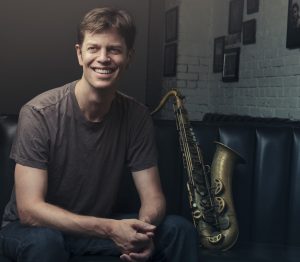
Saxophonist Donny McCaslin and his band, featured on David Bowie’s Blackstar, will make their Motéma Music debut with the October 14, 2016 release of Beyond Now, a highly anticipated album dedicated to Bowie. Recorded nearly three months after Bowie’s passing, the project is deeply influenced by their extraordinary experience collaborating with one of the greatest artists of all-time on his final album.
“It was like a dream except it was something I never could have dreamed of,” reflects McCaslin on working hand-in-hand with Bowie on Blackstar. “David Bowie was a visionary artist whose generosity, creative spirit, and fearlessness will stay with me the rest of my days. Beyond Now is dedicated to him and to all who loved him.”
Comprised of core Blackstar personnel, bassist Tim Lefebvre (Tedeschi Trucks Band, Saturday Night Live), drummer Mark Guiliana (Meshell Ndegeocello, Brad Mehldau), and Jason Lindner(Now Vs Now) along with guitarist Nate Wood and producer David Binney, Beyond Now’s repertoire is expansive, comprised of two Bowie songs, covers of Deadmau5, MUTEMATH, and the Chainsmokers, as well as compelling McCaslin originals including the title composition, inspired by a track inspired by a song McCaslin recorded for Blackstar that didn’t make the album.
With three GRAMMY® nominations and 11 albums to his name, McCaslin’s path to Bowie and Beyond Now can be traced back to 2011 with the release of his album Perpetual Motion, taking on an electric direction for the first time in contrast to his previous acoustic projects. Two subsequent albums Casting for Gravity (2012) and Fast Future (2015) released with his working band were directly influenced by electronica artists (covering groups such as Aphex Twin, Boards of Canada, and Baths), which netted McCaslin a 2013 GRAMMY® nomination for “Best Improvised Jazz Solo.”
The once in a lifetime opportunity to work with David Bowie came after composer Maria Schneider, a longtime collaborator, recommended McCaslin and his group to Bowie. Schneider and Bowie were collaborating on the track “Sue (Or in a Season of Crime),” which featured McCaslin as a soloist. In June 2014, Bowie heeded Schneider’s advice and made a visit to hear McCaslin and company at the 55 Bar in Greenwich Village. Soon after, Bowie began corresponding with McCaslin over email and sending music, forming a new collaboration and friendship that transpired through the recording of Blackstar until Bowie’s passing. The result is Beyond Now, which documents “David Bowie’s Last Band” as they were processing both their grief and Bowie’s distinctive impact.
“This new album is an expression of that journey for all of us,” says McCaslin. “David allowed Blackstar to be what it was going to be regardless of how people might have categorized it. More than anything, it was his fearlessness in crossing musical boundaries and genres in his music and life that inspired the approach I’m taking in Beyond Now. I am indebted to Bowie for showing me the risks and rewards of going for your uncompromising musical vision.”
Cory Henry in Residence April 3-7
Residency Concert at the Music Center – 7:00 PM April 7th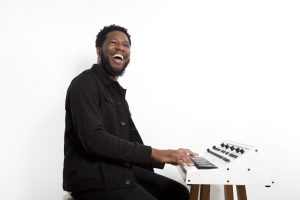
You might know Cory Henry as an in-demand, multi-instrumentalist and producer who’s worked with an array of musical legends across genres, including Yolanda Adams, Sara Bareilles, P. Diddy, Kirk Franklin, Kenny Garrett, Robert Glasper, Derrick Hodge, Shaun Kingston, Donald Lawrence, Michael McDonald, Boyz II Men, NAS, Bruce Springsteen, The Roots and as a member of the Grammy Award-winning collective Snarky Puppy.
But, The Revival, (GroundUP Music/Universal Music Classics), Cory’s latest release and touring project, is truly Henry’s story, a live album and DVD showcasing Henry’s deep musical roots, both in the church and outside of it. Filmed and recorded in Brooklyn at the Greater Temple of Praise, The Revival showcases Henry’s musical roots in gospel, jazz and soul. Working off his instrument of choice — the Hammond B-3 organ — the musician is joined by drummer James Williams and his godfather, Bishop Jeffrey White, who delivers a stunning vocal take on “Old Rugged Cross.” On this special night, the Brooklyn native’s improvisation was on full display: at times playful, soulful and powerful, nodding to musical influences (jazz, gospel, R&B) but greatly expanding on the sound. “For me, it was playing my favorite instrument in my musical garden,” he says. “I just wanted to use my upbringing and the music in my heart and bring it to my listeners. I think this record is a more soulful, touching piece than it is anything else. It’s a project from my heart.”
While not having much “formal” training, Henry started playing the Hammond at the age of two. By six he was competing at the Apollo Theater, where he made it to a finalist round. Honing a discipline found while performing in church, Henry eventually branched out from the gospel and spirituals of his very early days to find a range of non-secular influences and playing styles. The documentary “Gotcha Now” delves into Henry’s story, watch Part 1 and Part 2 here and here. “The Hammond organ doesn’t get enough credit in today’s musical society,” he says. “It’s my favorite instrument, my first love. It’s mainly used in church, but I wanted to show it’s not just something for the church.”
Although the setlist on The Revival draws from a well-known canon (from old gospels to Stevie Wonder), Henry stretches and pulls, driving the songs into unfamiliar territory and coming up with altogether new takes. There’s an almost frenzy to “That’s Why I’m Happy” and “I Want to Be Ready,” while other songs move the crowd to, well, happier places. “I did ‘If You’re Happy and You Know It’ because it’s fun,” says Henry, who gets his fans into a full singalong. “And it’s interesting how it works, because it comes right before the devotional tune ‘That’s Why I’m Happy.’”
Henry, a Best R&B Grammy-winner with Snarky Puppy (and once again nominated with SP for a Best Contemporary Instrumental Album Grammy for the 2015 album Sylva), will also release a second album later this year, this one with The Funk Apostles. Whereas The Revival is a tribute to his first love, the Hammond organ, and a showcase for his exceptional talents on the instrument, the coming album with The Funk Apostles will feature a full band sound – forged by nearly 100 shows over the last year. It is a synthesis of Henry’s many influences – Michael Jackson, Marvin Gaye, Prince, Herbie Hancock, Jimi Hendrix, Stevie Wonder, James Brown. Henry will be taking a classic sound into the here and now. As Henry says, “my way, my take.”

